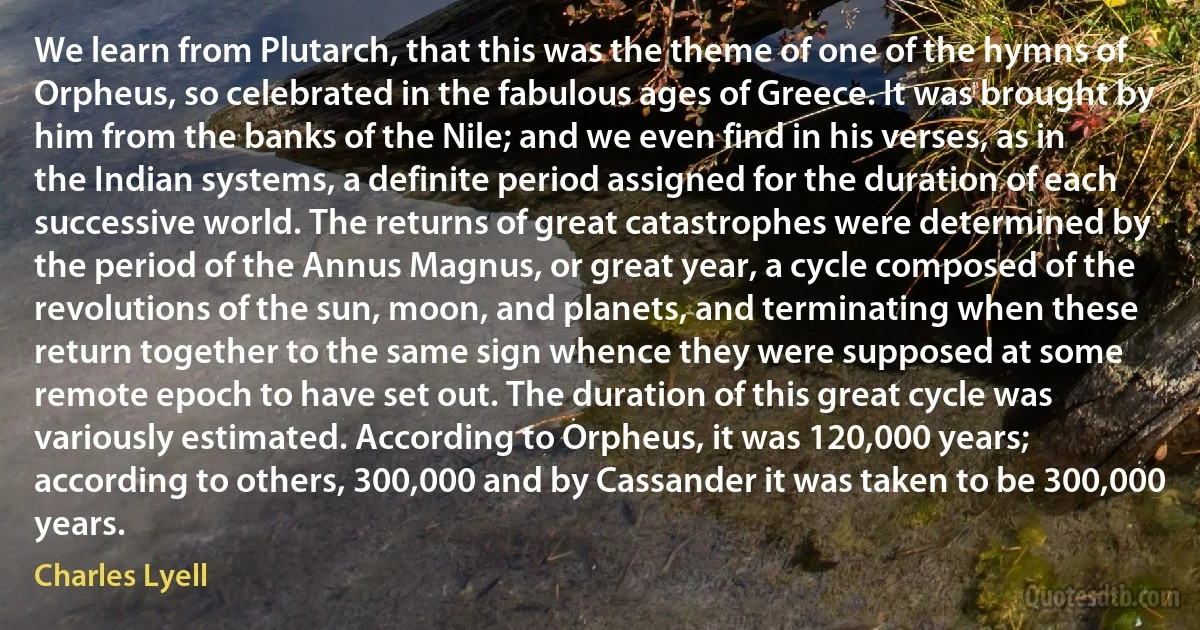
We learn from Plutarch, that this was the theme of one of the hymns of Orpheus, so celebrated in the fabulous ages of Greece. It was brought by him from the banks of the Nile; and we even find in his verses, as in the Indian systems, a definite period assigned for the duration of each successive world. The returns of great catastrophes were determined by the period of the Annus Magnus, or great year, a cycle composed of the revolutions of the sun, moon, and planets, and terminating when these return together to the same sign whence they were supposed at some remote epoch to have set out. The duration of this great cycle was variously estimated. According to Orpheus, it was 120,000 years; according to others, 300,000 and by Cassander it was taken to be 300,000 years.
Charles LyellRelated topics
cycle definite duration epoch find great greece learn moon orpheus return set sign sun take theme world year others 120 years Plutarch returnsRelated quotes
Freedom means free speech, not politically correct safe spaces. Freedom means religious freedom, whether you are Christian, Jew, Muslim, or atheist. Whether you are gay, or straight, the Bill of Rights protects the rights of all of us to live according to our conscience. Freedom means the right to keep and bear arms, and to protect your family. Freedom means that every human life is precious and must be protected. Freedom means Supreme Court Justices who don't dictate policy, but instead follow the Constitution. And, freedom means recognizing that our Constitution allows states to choose policies that reflect local values. Colorado might decide something different than Texas. New York different than Iowa. That's the way it's supposed to be, diversity. If not, what's the point of having states to begin with?

Ted Cruz
No one says in the morning: A day is soon past, let us wait for the night. On the contrary, in the evening we consider what we shall do the next day. We should be very sorry to spend even one day at the mercy of time and bores. ... Who can be certain of spending an hour without being bored, if he takes no care to fill even that short period according to his pleasure. Yet what we cannot be certain of for an hour, we sometimes feel assured of for life, and say: "If death is the end of everything, why give ourselves so much trouble? We are extremely foolish to make such a pother about the future”-that is to say, we are extremely foolish not to entrust our destinies to chance, and to provide for the interval which lies between us and death.

Luc de Clapiers, Marquis de Vauvenargues
Behold therefore, this England of the Year 1200 was no chimerical vacuity or dreamland, peopled with mere vaporous Fantasms, Rymer's Foedera, and Doctrines of the Constitution, but a green solid place, that grew corn and several other things. The Sun shone on it; the vicissitude of seasons and human fortunes. Cloth was woven and worn; ditches were dug, furrowfields ploughed, and houses built. Day by day all men and cattle rose to labour, and night by night returned home weary to their several lairs. In wondrous Dualism, then as now, lived nations of breathing men; alternating, in all ways, between Light and Dark; between joy and sorrow, between rest and toil, between hope, hope reaching high as Heaven, and fear deep as very Hell. Not vapour Fantasms, Rymer's Foedera at all!

Thomas Carlyle
For ourselves, who are ordinary men and women, let us return thanks to Nature for her bounty by using every one of the senses she has given us; vary our state as much as possible; turn now this side, now that, to the warmth, and relish to the full before the sun goes down the kisses of youth and the echoes of a beautiful voice singing Catullus. Every season is likeable, and wet days and fine, red wine and white, company and solitude. Even sleep, that deplorable curtailment of the joy of life, can be full of dreams; and the most common actions-a walk, a talk, solitude in one's own orchard-can be enhanced and lit up by the association of the mind. Beauty is everywhere, and beauty is only two finger's-breadth from goodness.

Virginia Woolf
For what advantage is it, that the world enjoys profound peace, if thou art at war with thyself? This then is the peace we should keep. If we have it, nothing from without will be able to harm us. And to this end the public peace contributes no little: whence it is said, ‘That we may lead a quiet and peaceable life.' But if any one is disturbed when there is quiet, he is a miserable creature. Seest thou that He speaks of this peace which I call the third (inner, ed.) kind? Therefore when he has said, ‘that we may lead a quiet and peaceable life,' he does not stop there, but adds ‘in all godliness and honesty.' But we cannot live in godliness and honesty, unless that peace be established. For when curious reasonings disturb our faith, what peace is there? or when spirits of uncleanness, what peace is there?

John Chrysostom
